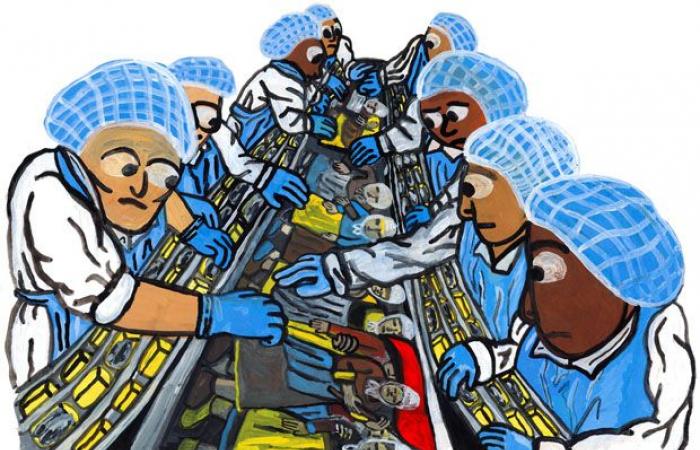With Listen to their anger growl (Libertalia, October 2024), the friend and comrade of QED Tiphaine Guéret looks at the daily life of fish cannery workers in Douarnenez, a century after the legendary victorious strike of 1924. The situation has changed, but the substance remains the same: rotten working conditions and rapacious capitalism.
Mathilde Peace
« It islisten to the sound of their hooves / Here come the factory workers / Listen to the sound of their hooves / Here come the Penn Sardins. » Those familiar with militant choirs necessarily have in mind this refrain, composed by the accordionist Claude Michel, in honor of the workers of the Douarnenez canneries and their victorious strike of 1924. We still regularly sing “Les Penn Sardin”, from Marseille to Limoges, according to the struggles, as theirs has entered the imagination of social conquests won by hard struggle. Because it took determination so that in this “Zola-style universe in the depths of Finistère”, as characterized by Anne Crignon in a work she dedicated to them1, these two thousand workers on strike snatched a real victory (notably a clear salary increase). Six weeks of fierce struggle, symbolized by the final, more combative refrains, composed by the accordionist: “ Listen to their hooves clicking / Listen to their anger growling / Listen to their hooves clicking / It's the sardine fishing strike. »
« Mythical, the strike is first and foremost because it is led by women », writes Tiphaine Guéret in her work whose title refers to the aforementioned hit, Listen to their anger growl2. « You have to imagine them pounding the streets to the sound of The International, raising their fist against their inhumane living conditions. » But the investigator friend, also an experienced sailor of the trawler QED of which she was for a time editorial secretary, wanted to update the subject. She went to see what was going on today in the two surviving fish canneries, Paulet (Petit Navire brand) and Chancerelle (Connétable). “ There would be something frustrating in leaving the clock stuck on the triumphant winter of 1924 and being satisfied with the folklorization of the strike “, she preambles. And to add: “ Even today, the economic life of Douarnenez largely revolves around sardines and fish packaging, and its canneries still employ a large number of women, in conditions representative of the operating situations specific to our time. Their story also deserves to be told, and that is what this book sets out to do. »
Mission accomplished. If the revolutionary ferment of Douarnenez “the Red”3 seems distant, the pages of the work suggest the possibility of a “common front” against the new conditions of exploitation. A century later, the spark is not completely extinguished… Selected pieces.
By Émilien Bernard
Chapter X: “Like Links that can be exchanged”
« Une of the reasons for the anger and disappointment of the workers is undoubtedly the gap between their experience and the rewarding image that the family business gives itself. The oldest seem to have happy memories of their first years at Chancerelle. Working conditions were already difficult – as evidenced by Marie Hélia’s film The Sardine Girlsfilmed in 2000 – but the atmosphere was not the same. The management greeted the workers every morning and negotiated low-cost langoustines for them from the fishermen for the holidays. When a new recipe was launched, they were consulted with cans of sardines offered for the whole family. Old-fashioned paternalistic capitalism. A proven managerial technique, aimed at maintaining employees in the illusion of belonging to a family. Toxic ? Certainly. But, for many, it was better than the current regime.
Management greeted the workers every morning and negotiated low-cost langoustines for them for the holidays.
“It's young chefs now, for the most partsays Mathilde. They have something to prove. They have not known the factory, they do not know the arduousness. For some, we are like links that can be exchanged. Before, each had its importance. Today, there are so many job seekers that we say we can be exchanged at any time. There are always people at the door.”
This feeling is shared by Sarah: “We are no longer considered, we are numbers. We're just pawns. We have no value in front of these people. I don't know where they got this team of leaders, but they are not up to the task. Some have never worked fish, never worked a line. The identity of the factory has been lost.”
“We are no longer considered, we are numbers, we have no value in front of these people”
According to a CGT union representative from the company, the shift began in the early 2010s, at the time of the move to the Lannugat site, which would coincide with the introduction of 2/8. A clear worsening would then have been felt from 20194. “At Chancerelle, paternalism reigned until 2010 and 2012. Then the financiers arrived.”
“Financiers.” The word comes back in the mouths of many workers, to evoke those who are today at the head of their factory. Chief among them Jean Mauviel, general director of Maison Chancerelle since 20195, succeeding the ten-year reign of Jean-François Hug, first manager of the company not a member of the Chancerelle family. A “financier”, Mauviel? In any case, the man has worked in large agri-food companies: Saupiquet, Daucy but also Findus, for the best known. Just like Philippe Cloarec, industrial director, who worked for the Jean Hénaff groups (that of the famous Breton pâtés) and Jean Caby, the king of cocktail sausages. This is also the case of Benoît Allais, factory director, who worked at Madrange and Captain Cook, as well as Julie Galauziaux, manager of the sardine factory, who also worked for Hénaff, as well as Intermarché. All have held their position since 2019.
“At Chancerelle, it was paternalism that reigned until 2010, 2012, then the financiers arrived”
With these new faces, explains the union delegate, “would have arrived”the lean management6, modern, aggressive management: at the gutting stage, they work with a diagram before their eyes which tells them when the company is losing money, when it is profitable, when it is making money. Everything is calculated to the nearest cent”.
Even paid leave: employees who wanted to return to their position in therapeutic part-time after a work stoppage were allegedly put on forced leave by Chancerelle, due to a lack of work for them. Even more serious, employees' paid leave would sometimes be used to compensate for technical hazards, for example machine breakdowns.
“At the gutting stage, they work with a diagram in front of them that tells them when the company is losing money and when it is profitable”
What does Chancerelle have to say about it? On the first point, the company is categorical: it “is not aware of such cases and complies with the advice of the occupational physician”. As for the second, she assures that she “only implements decisions taken collectively” and states: “The organization of work is governed by a company agreement signed by the CGT, which defines the conditions relating to changes in schedules and notice periods.”
Either. The fact remains that the year 2019 marked a turning point in the memory of workers. The date from which human relationships disintegrate, small arrangements are canceled… And this unpleasant impression of being nothing more than labor, drudgery, flexible and interchangeable.
Enough to create a common front among workers? »






